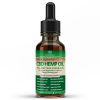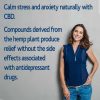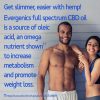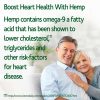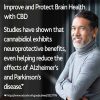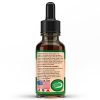Evergenics Organic CBD Hemp Oil Is A Premium Formula Rich In CBD (Cannabidiol) and Omega 3s, 6s and 9s for Maximum Health Benefits
While our hemp formula is created from the active parts of the Cannabis sativa plant, it does not contain the compound called THC, the substance that gives marijuana its high-producing effects.
Main Uses: Oral and Topical
1. When using orally, for best medicinal results, place 1 ml (approximately the amount of a dropper half full) under the tongue for 45 seconds to 1 minute, then swallow.
2. Topically: For skin or scalp, apply 3 to 4 drops or desired amount and gently massage into area you are seeking to treat.
Benefits Of CBD Hemp Oil Supported By Medical Research
1. Reduces Anxiety
Controlled studies have shown that CBD can reduce symptoms of generalized social anxiety disorder.1Bergamaschi, M M. Neuropsychopharmacology, May 2011. www.ncbi.nlm.nih.gov/pubmed/21307846 Tests results using brain imaging have shown that CBD reduces social anxiety by affecting the limbic and paralimbic areas of the brain.2https://www.ncbi.nlm.nih.gov/pubmed/20829306 Numerous published medical summaries establish CBD as an anxiolytic (anti-anxiety) drug that has beneficial effects on the human body’s endocannabinoid system.3https://www.ncbi.nlm.nih.gov/pubmed/22729452 4https://www.ncbi.nlm.nih.gov/pubmed/24923339
2. Relieves Pain
The human endocannabinoid system is involved in many physiological and cognitive processes including pain sensation.5https://www.nature.com/articles/npp2017204 Two primary endocannabinoid receptors have been identified: CB1 and CB2. Studies have shown that cannabinoids like CBD play a role in activating CB1 and CB2 which causes a reduction in the sensation of pain.6https://www.ncbi.nlm.nih.gov/pubmed/19789075 7https://www.ncbi.nlm.nih.gov/pmc/articles/PMC2503660/ A systemic review published in the Official Journal of the American Academy of Orofacial Pain of 13 studies concludes that, “cannabinoids may provide effective analgesia in chronic neuropathic pain in conditions that are refractory to other treatments.” 8https://www.ncbi.nlm.nih.gov/pubmed/25635955
3. Helps Arthritis Sufferers
In a controlled trial involving 58 human patients, cannabis-based medicine administered orally helped arthritis sufferers experience less pain during movement, less pain at rest and better sleep compared to placebo.9Blake DR, Rheumatology (Oxford) 2006;45:50–2. Other research has shown that cannabidiol not only relieves arthritis pain and reduces inflammation, but protects the joints from damage as well.10https://www.ncbi.nlm.nih.gov/pubmed/10920191/ Applying cannabidiol topically has also been shown to have “long-lasting” therapeutic effects on arthritis symptoms.11https://www.ncbi.nlm.nih.gov/pmc/articles/PMC4851925/
4. Improves Sleep
In research on humans, cannabidiol has been shown to “promptly” and “substantially” improve sleep by reducing the frequency of REM sleep behavior disorder events.12https://www.ncbi.nlm.nih.gov/pubmed/24845114 Notable improvement in sleep has been reported in additional studies involving CBD and 2000 patients and 1000 patient hours of exposure, including patients with multiple sclerosis, peripheral neuropathic pain, intractable cancer pain and rheumatoid arthritis.13https://www.ncbi.nlm.nih.gov/pubmed/17712817
5. Grows Hair, Prevents Hair Loss and Improves Hair Health
Hemp oil is rich in omega-3 and omega-6 fats that nourish hair, support hair thickening and reduce inflammation that can lead to hair loss.14https://draxe.com/vitamins-for-hair-growth/ A study published in the Journal of Cosmetic Dermatology evaluating 120 healthy subjects found that after six months of supplementing with omega3s and omega6s hair density and growth had significantly improved.15https://www.ncbi.nlm.nih.gov/pubmed/25573272 Evergenics CBD Hemp Oil contains a type of omega-3 fatty acid called linolenic acid. Dr. Andrew Weil writes that linolenic acid, “stimulates growth of hair and nails, improves the health of the skin, and can reduce inflammation.”16https://thermolift.com/wp-content/uploads/2018/08/hemp-oil.pdf
6. Promotes Weight Loss
If you are one of those always looking for new ways to lose weight easier, you might be surprised that hemp oil can help. Hemp oil contains oleic acid. Research has shown that increasing consumption of oleic acid, an omega-9 fatty acid, not only increases resting metabolic rate, it also makes subjects more inclined to engage in physical activity further supporting weight loss and better health.17https://www.ncbi.nlm.nih.gov/pubmed/23446891 The oleic acid found in hemp oil may also help curb snacking and overeating. Researchers at University of California, Irvine, have shown that oleic acid boosts production of a compound called oleoylethanolamine (OEA). OEA activates brain pathways that increase the feelings of fullness, promote weight loss and help lower blood cholesterol.18https://www.sciencedaily.com/releases/2008/10/081007123647.htm
7. Reduces Inflammation and Provides Antioxidant Benefits
Cannabinoids are potent anti-inflammatory agents and they exert their effects through induction of apoptosis, inhibition of cell proliferation, suppression of cytokine production and induction of T-regulatory cells.19https://www.ncbi.nlm.nih.gov/pmc/articles/PMC2828614/ Research published in two journals, the American Journal of Physiology and Therapeutics and Clinical Risk Management, cite more than a dozen studies demonstrating the potency of cannabidiol as a anti-inflammatory and antioxidant.20https://www.physiology.org/doi/10.1152/ajpheart.00236.2007 21https://www.ncbi.nlm.nih.gov/pmc/articles/PMC2503660/ Inflammation has been linked to many serious health conditions including arthritis, allergies, cancer, heart disease, diabetes, high blood pressure, kidney failure, autoimmune disease and Alzheimer’s disease.22https://www.health.harvard.edu 23mercola.com
8. Fights Cancer
According to the National Cancer Institute cannabidiol can prevent cancer growth, relieve cancer symptoms and reduce the side effects of cancer treatment.24NCI Drug Dictionary: Cannabidiol 25Cancer.gov
Research available at the National Institutes of Health shows that cannabidiol can help prevent and fight a wide range of cancers in areas of the human body:
• Bladder26https://www.ncbi.nlm.nih.gov/pubmed/20546877
• Brain27Massi, P, J. Pharma. Exp. Ther. “Antitumor effects of cannabidiol, a nonpsychoactive cannabinoid, on human glioma cell lines.” 28Rocha, F.C. Journal of Neuro-Oncology. “Systematic review of the literature on clinical and experimental trials on the antitumor effects of cannabinoids in gliomas.” 29Nabissi, M. “Triggering of the TRPV2 channel by cannabidiol sensitizes glioblastoma cells to cytotoxic chemotherapeutic agents.” Carcinogenesis (2013). 30https://www.ncbi.nlm.nih.gov/pubmed/24204703 31https://www.ncbi.nlm.nih.gov/pubmed/23349970 32cannabis-med.org
• Breast33McAllister. S. “Cannabidiol as a novel inhibitor of Id-1 gene expression in aggressive breast cancer cells.” Molecular Cancer Therapeutics (2007). 34Ligestri. A., Moriello, A. “Antitumor activity of plant cannabinoids with emphasis on the effect of cannabidiol on human breast carcinoma.” Journal of Pharmacology and Experimental Therapeutics 35https://www.ncbi.nlm.nih.gov/pubmed/21566064 36Takeda. S., Okajima. S. “Cannabidiolic acid, a major cannabinoid in fiber-type cannabis, is an inhibitor of MDA-MB-231 breast cancer cell migration.” Toxicology Letters (2012).
• Colon37“Aviello. G., Romano. B. “Chemopreventive effect of the non-psychotropic phytocannabinoid cannabidiol on experimental colon cancer.” Journal of Molecular Medicine (2012). 38Sreevalsan. S., Joseph. S. “Induction of apoptosis by cannabinoids in prostate and colon cancer cells is phosphatase dependent.” Anticancer Research (2011). 39Romano. B., Borrelli. F. “Inhibition of colon carcinogenesis by a standardized Cannabis sativa extract with high content of cannabidiol. Phytomedicine: International Journal of Phytotherapy and Phytopharmacology (2014).”
• Endocrine System40https://www.ncbi.nlm.nih.gov/pubmed/18508995
• Kaposi Sarcoma41https://www.ncbi.nlm.nih.gov/pubmed/23264851
• Leukemia42McKallip. R., Jia. W. “Cannabidiol-induced apoptosis in human leukemia cells: A novel role of cannabidiol in the regulation of p22phox and Nox4 expression.” Molecular Pharmacology (2006) 43Ruth Gallily, Tal Even-Chen, Galia Katzavian, Dan Lehmann, Arie Dagan & Raphael Mechoulam. “γ-Irradiation Enhances Apoptosis Induced by Cannabidiol, a Non-psychotropic Cannabinoid, in Cultured HL-60 Myeloblastic Leukemia Cells.” Leukemia & Lymphoma (2009).
• Lung44Ramer. R., Bublitz. K. “Cannabidiol inhibits lung cancer cell invasion and metastasis via intercellular adhesion molecule-1.” FASEB: The Official Journal of Federation of American Societies for Experimental Biology (2012). 45Ramer. R., Heinemann. K. “COX-2 and PPAR-γ confer cannabidiol-induced apoptosis of human lung cancer cells.” Molecular Cancer Therapeutics (2013). 46Ramer. R., Rohde. A “Decrease of plasminogen activator inhibitor-1 may contribute to the anti-invasive action of cannabidiol on human lung cancer cells.” Pharmaceutical Research (2010).
• Prostate47https://www.ncbi.nlm.nih.gov/pubmed/22849856 48Sharma. M., Hudson. J. “In Vitro Anticancer Activity of Plant-Derived Cannabidiol on Prostate Cancer Cell Lines” Scientific Research (2014). 49Sreevalsan. S., Joseph. S. “Induction of apoptosis by cannabinoids in prostate and colon cancer cells is phosphatase dependent.” Anticancer Research (2011).
• Skin50Adinolfi. B., Romanini. A. “Anticancer activity of anandamide in human cutaneous melanoma cells.” European Journal of Pharmacology (2014).
9. Improves and Protects Brain Health
Neurodegenerative disease is the progessive decline in function of neurons primarily in the brain. Parkinson’s, Alzheimer’s, ALS (Lou Gehrig’s disease), Huntington’s and dementia are types of neurodegeneration-caused brain diseases. Symptoms include memory loss, anxiety, forgetfulness, apathy, mood changes and loss of inhibition. Cannabidiol has exhibited neuroprotective effects and may help manage neurodegenerative diseases like Alzheimer’s.51Esposito. G., De Filippis. D. “The marijuana component cannabidiol inhibits beta-amyloid-induced tau protein hyperphosphorylation through Wnt/beta-catenin pathway rescue in PC12 cells.” Journal of Molecular Medicine (2006). 52Iuvone. T., Esposito, G. “Neuroprotective effect of cannabidiol, a non-psychoactive component from Cannabis sativa, on beta-amyloid-induced toxicity in PC12 cells.” Journal of Neurochemistry (2004). 53Hampson. A., Grimaldi. M. “Cannabidiol and (−)Δ9-tetrahydrocannabinol are neuroprotective antioxidants.” Proceedings of the National Academy of Sciences of the United States of America (1998). A double-blind study published in the Journal of Psychopharmacology has shown that Parkinson’s disease patients treated with cannabidiol experienced improved quality of life.54https://www.ncbi.nlm.nih.gov/pubmed/25237116
10. Improves Heart Health
Research published in the British Journal of Clinical Pharmacology tells us that cannabidiol benefits the cardiovascular system by protecting against vascular damage caused by high blood sugar, inflammation and diabetes.55https://www.ncbi.nlm.nih.gov/pubmed/22670794 In the same report, cannabidiol was observed to increase blood flow and reduce cardiovascular responses to stress. A study published in the Journal of the American College of Cardiology, using molecular analysis, electron spin resonance spectroscopy and flow cytometry, concludes that cannabidiol can be a beneficial treatment for cardiovascular disorders by relieving oxidative stress and inflammation.56Rajesh. M., Mukhopadhyay. P. “Cannabidiol Attenuates Cardiac Dysfunction, Oxidative Stress, Fibrosis, and Inflammatory and Cell Death Signaling Pathways in Diabetic Cardiomyopathy.” Journal of the American College of Cardiology (2010).
11. Relieves Psoriasis and Itchy Skin
Psoriasis is a skin disorder that leaves sufferers with red patches, scaling and dry, cracked skin. A study published by the Journal of Dermatological Science determines that cannabinoids can help treat psoriasis by inhibiting the growth of keratinocytes.57Wilkinson. J., Williamson. E. “Cannabinoids inhibit human keratinocyte proliferation through a non-CB1/CB2 mechanism and have a potential therapeutic value in the treatment of psoriasis.” Journal of Dermatological Science (2007). Hyperproliferation of keratinocytes is a cause of psoriasis.
Unbalanced immune function is known as one of the causes of psoriasis, and cannabidiol’s effect on supporting a healthy immune system may be another reason for using it to alleviate and stop psoriasis.
In a study on human subjects with uremic pruritus (severely itchy skin caused by poor kidney function), nearly 40% of the patients had seen their pruritus completely reversed and more than 80% were observed to have had a “complete” reduction of dry skin after a three-week treatment with cannabinoid cream.58https://www.ncbi.nlm.nih.gov/pubmed/16324422 In a German trial the average itch reduction was shown to be 86.4% in pruritus patients treated with a topical cannabinoid agonist.59https://www.ncbi.nlm.nih.gov/pubmed/16874533
12. Combats Acne
Sebocytes are sebum-producing epithelial cells. Research published by the Journal of Clinical Investigation shows that the administration of cannabidiol suppresses sebocyte proliferation and due to its lipostatic, anti-proliferative and anti-inflammatory effect, cannabidiol may be used successfully in the treatment of acne vulgaris.60Olah. A., Toth. B “Cannabidiol exerts sebostatic and antiinflammatory effects on human sebocytes.” Journal of Clinical Investigation (2014). In a controlled 12-week study in which healthy males were treated with a cannabis seed topical extract, it was shown that skin sebum and skin redness were reduced “significantly.”61https://www.ncbi.nlm.nih.gov/pubmed/26142529 The authors of the study have suggested that cannabis could be prescribed for acne vulgaris, seborrhea, papules and pustules.
Enjoy All The Benefits Of Evergenics Organic CBD Hemp Oil Today!
Like all Evergenics health products, our organic CBD hemp oil is made in the USA and doctor-formulated to be stronger, purer and safer than any other product of its kind. Unlike some hemp seed oil supplements that contain zero CBD, Evergenics CBD Hemp Oil gives you a maximum-strength dose of cannabidiol and omega-3s, omega-6s and omega-9s so you can experience all of the benefits of hemp to the fullest! Every purchase is 100% risk-free. Try Evergenics Organic CBD Hemp Oil today and if it doesn’t fully meet your expectations, we’ll give you a hassle-free, no-questions-asked refund!
References
